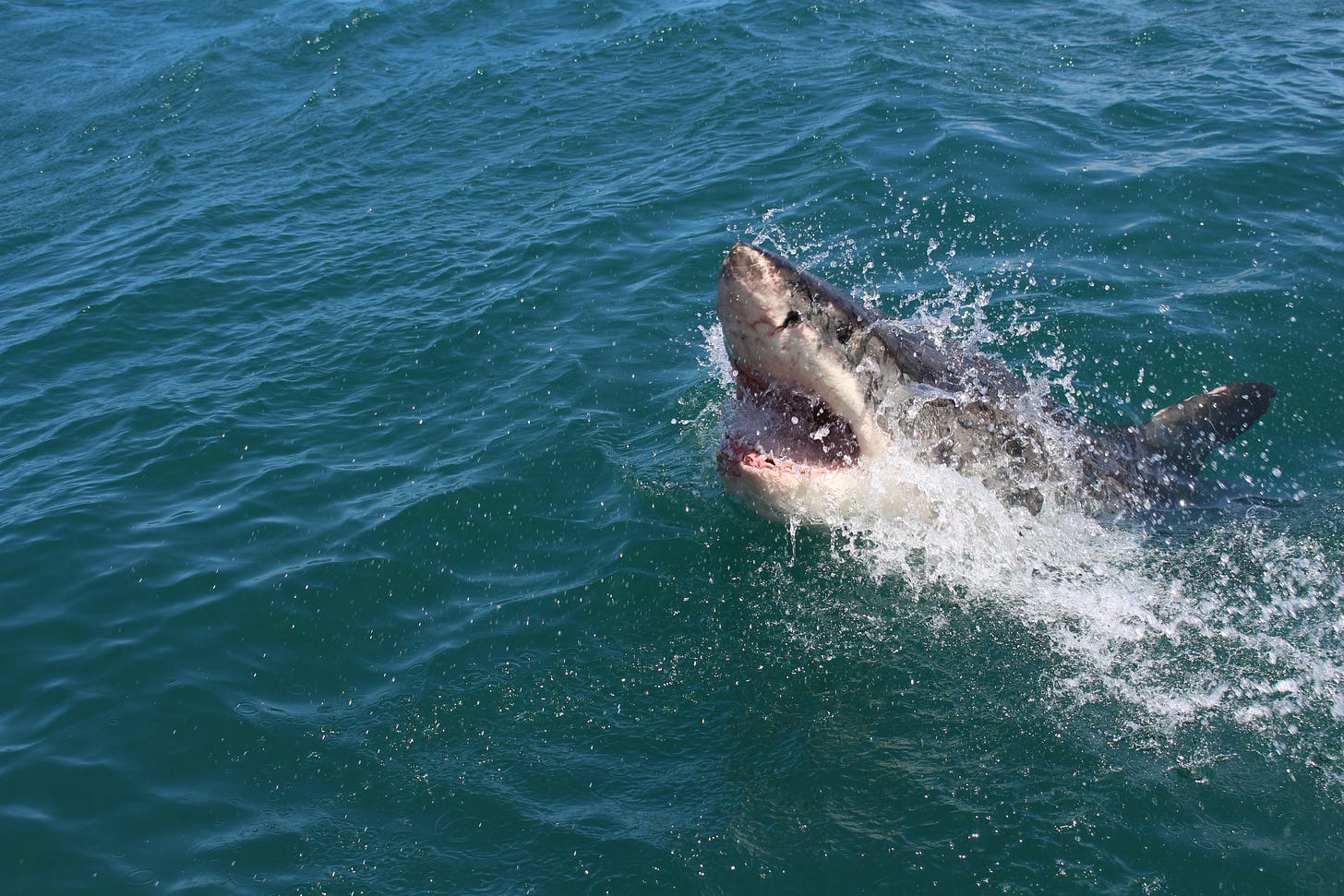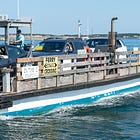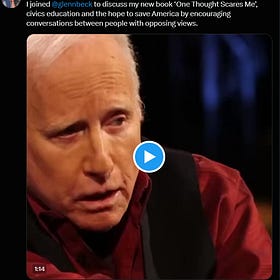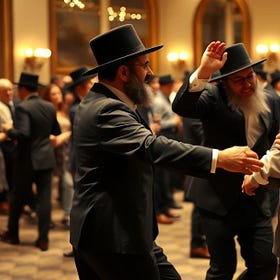Tisha B'Av and Jaws
You're going to need a bigger heart.

The saddest day in Judaism drops on us in the middle of summer, and since it lasts from sundown until nightfall the following day, it is a long sad day. It is the fast day of Tisha B’Av, and it is a grinding wheel of a fast. It is not an official holiday, and I remember when I was younger fasting while working in factories with no air-conditioning, and later in my greenhouses when I was a farmer. Sometimes, being busy takes your mind off the thirst and hunger, but since it is such a long fast, there are always those moments when it hits you. I do not enjoy the run-up to this fast either. It is preceded by a half-fast (morning till sunset, like Muslims on Ramadan) three weeks earlier, the 17th of Tammuz, and the period between those fasts is called the Three Weeks. A time of no music, no haircuts, no shaving, no beach-going.
As Jews know, as bad as it gets, it can always get worse. That is pithiness we could do without already but not everything is under our control. So in the run-up to one particular Tisha B’Av, during one Intifada or another, things were grim overall in Gush Katif, just perfect for a twenty-five hour fast. The stomach-growls during prayer would echo the surrounding sounds of conflict. Except that this was a fast I would not be completing at home. I was scheduled to fly to the United States for a rare visit with my mother. My wife was not happy with my leaving at that time, understandably, but the ticket was one of those discount kinds where you use it or lose it. So there was added tension and sadness in our home.
Many times when I have visited the United States since moving to Israel, shortly before leaving something appears on my radar screen, some kind of benign portent, that pertains to that visit. This time I was standing in an office waiting for something, and picked up a day-old newspaper to pass the time. I did not even look at the front page, as I knew already what would appear there and had no patience for it. I randomly opened to an inner page, and my eyes lit upon a very small item near the center fold. “Richard Dreyfuss to Visit Israel on a Fact-Finding Mission.” My heart jumped out of a fondness for Richard Dreyfuss but just as quicky splat landed. For a moment I thought that he would be coming to research a new film project, but before I began to read the article I knew, I just knew with Three Weeks knowledge, that it was not to be. He was coming to get the facts about the Intifada, first hand, and even-handedly at that. He was going to split his visit between Tel Aviv and Ramallah. Before I traveled he did show up—it made the news—and I began to think differently of Richard Dreyfuss.
Which is saying something. Because Richard Dreyfuss was a big part of the gift that Hollywood gave to Martha’s Vineyard back in the early 70’s. Those of us on the island who had lived through the train wreck known as Chappaquiddick and who had thought that that Kennedy stain on our dress would define the island forever saw it washed away by Stephen Spielberg’s new invention: the summer blockbuster. It worked everywhere, from the mid-west where I went to college to the middle-east. It would go like this: “Where are you from?” “Martha’s Vineyard Island.” “Where’s that?” “Have you seen the movie Jaws?” “Yes.” “I’m from there.” Short, precise, and with a little pizzaz. Compare that with: “You remember when Ted Kennedy drove off a bridge and a young woman died as a result? I’m from the island that is right next to the one where that happened.” Elliptical, vague and depressing all around. I wrote an account of that event somewhat rehabilitating the memory of Ted Kennedy but more importantly, the memory of Mary-Jo Kopechne:
In a way, we were of Jaws, as Jaws was of us. The cliché-ridden characters of the movie reflected known island types. We were somewhat appalled by the shallow but accurate depictions of ourselves and at the same time proud that MV had made the big time, and that we were literally on the map. And there actually is an economy based on a short tourist season that is sacrosanct. Meaning that the premise of the movie is entirely believable.
The Dreyfuss type was not of the island, but arguably was as recognizable to islanders as the island types themselves. He was the arrogant, sarcastic, and pushy off-islander. Otherwise fondly known by locals as a “New York Jew”. But Dreyfuss, a Jew, wasn’t playing a Jew in Jaws. He was in camouflage. He played an Other that was suitable for a summer blockbuster. He was a college boy. He had all the book knowledge of sharks and he could bark out statistics and species and dissect and catalogue what he dissected, but he could not hunt one down, nor, as the movie starts, did he see a need for hunting sharks. On second thought, maybe the camouflage is revealing more than it is hiding. Haven’t the Jews always been the college boys of Western culture?
In his shrine of the shark with jaws of sharks as wallpaper and a cauldron boiling more jaws to be hanged, and after initially rejecting him because of his “city hands,” Quint agrees to accept Matt Hopper (Dreyfuss’s character) as an initiate only after the latter shows Quint the secret handshake, successfully tying a sheepshank knot. Thus the quest began.
Though considered light-weight summer fare for the masses, still, Spielberg being Spielberg, there is an examination of the nature of evil in the movie. Is the shark mindless, or is it capable of willful action such as revenge? Or purposefully targeting humans? If it is mindless, then it is a force of nature and not “evil.” A shark will do what sharks do. However, if there is some sort of consciousness behind the actions of the shark, then it is evil.
A bloody threat to innocent victims (children and maidens), lurking in the background. Where have we encountered that before? And just like that, lurching out at you from the depths, is classical Antisemitism. The blood libel embodied in the bloodiest of creatures. The shark becomes Shylock, Jaws becomes Jews. Shylock gets his revenge when the shark gets his pound of flesh, over and over again. Dreyfuss, the new and improved Jew, appears on the scene to save the Gentiles from their nightmares, from their ingrained Antisemitism. The shark doesn’t need the blood of its kill to make matza for Passover. Neither do the Jews. Dreyfuss is the Jewish reality factor, bleeding like the Gentiles (comparing scars with Quint), quaffing beers with Quint, wearing work clothes like the common man. He’s an alright guy, paddling off into the sunrise at the end of the movie with the uber-Gentile chief of police, Brody.
Quint introduces the American Passover story: the sailors of the Indianapolis, being plucked from the ring of survivors willy-nilly by sea-going angels of death. Quint was passed-over, and since then he has lived with survivor’s guilt. Why his friend from Cleveland and not himself? The guilt to be assuaged only by joining his mates in being devoured by the gaping maw.
All this madness to show that I already had an internal conspiracy history with Richard Dreyfuss. His whirlwind fact-finding tour sent me into a depression. When were we going to see the end of this procession of liberal progressive Jews who inevitably find only the facts that lead them to bad-mouth Israel? What is the difference between the good-hearted, well-meaning, excellent actor attacking Israel, and a Jew-hater doing the same thing?
It was all wrong, but I was getting away from that, if only for a short while. How far away could I get? About as far as one can get. It was just a matter of passing through customs at Logan airport, walking thirty yards to the Bonanza bus stop, and getting on the bus to Woods Hole. That hour and a half bus trip through New England scenery was all it took to leave the Gaza Strip behind. If there was any residue, then the ferry from Woods Hole to the Vineyard took care of that.
But the doldrums span continents, and I could feel the murmuring of unease in my soul. The seagulls gliding alongside the ferry waiting for tourists to throw them crumbs served a different purpose for me. Their caws were laughter, at me, for thinking I could run away from what was pre-ordained.
Once again, it was through a newspaper that I climbed back in to the dark maw of Tisha B’Av. My eyes, portholes of my depression, portals of a magic synchronicity through space and time, did not disappoint. After I arrived at my mother’s, I sat with her over coffee, brought up my kosher dishes from the basement, spoke with my brother on the phone, and finally sat down for a rest in the living room. I reached over and picked up the local newspaper and scanned it randomly. If this had been the movie the two-note tuba would be playing. And there it was in the middle of the Martha’s Vineyard Times, an innocent notification of an event unnoticeable and irrelevant to most, that was an express love letter to me, with an anti-cupid’s arrow that pierced my heart.
“Bagels and Bonds” was the encouraging headline. A nice communal breakfast promoting Israel Bonds (a time-honored way for American Jews to invest in Israel, showing support, and to hopefully make some money). “With guest speaker Richard Dreyfuss just back from a fact-finding tour, who will speak about the situation in Israel.” My arm with the paper dropped to my side and my head dropped back into the recliner and I smiled to myself sardonically. I was in this play through to the final act whether I liked it or not.
There was now a tension in the air, instead of the expected relaxation of a visit with my mother on the Vineyard. I hadn’t brought it with me, I hadn’t invited it, but there it was, and in a sense I felt that it was more appropriate. I knew what the situation was in Israel at that time—I did not need Richard Dreyfuss to lecture me—but still, half-way around the world I had expected some relief. What could I do? I embraced the tension, hoping that by doing so I would find a point of equilibrium, where I could exist, where I could breathe. But this stupendous effort on my part did not bring with it any kind of resolution. Something was still nagging at me. I raised my inner eyes and hands to Heaven and asked “What now?” in minor desperation, only to immediately regret it because sometimes prayers like this are answered, and we are not always ready or willing to receive that answer. As if a voice from on high commanded me to “look again,” I opened the paper to the notification and looked again. It came to me slowly, but powerfully: the realization that the Israel Bonds drive was going to take place on Tisha B’Av. There would be a feast, not a fast.
Normally, this would be a red line for an observant Jew. Just by being present at an event where public eating occurs, one is identified with the eaters, whether one eats or not. It is considered a public affront to the Creator. Tisha B’Av is a serious fast in Judaism, with few indulgences (sick people and pregnant women are excused under certain conditions). In addition I had a personal reason for not attending. The Hebrew Center was supported and attended by life-long friends and acquaintances. The last thing I wanted was to flash my Orthodox Jewish observance around like a badge of honor, my presence and my fasting a silent but wrenching rebuke of those less observant. I was fond of the Island Jews, my schoolmates and their families. I had tremendous respect for them and their Rabbi, for finding a way to keep the Jewish flame alive on the island.
And that flame was larger than I had surmised. When I entered the Hebrew Center (because I did go in the end), I was greeted by none other than Ruth Stiller, who was from one of the original Jewish families on Martha’s Vineyard and who embodied the spirit of the sanctuary. I was honored and embarrassed by the attention she gave me, as she pulled me over to the side and said “I have something I want to share with you.” She went on to say that the night before (at the beginning of Tisha B’Av, since the Jewish day begins at sundown) they all sat down on the floor and lit candles and read and learned about the destruction of the temple in Jerusalem. I was speechless, and looked at her with tears in my eyes, saluting in my mind the Rabbi who had arranged that. The realization was stark and embarrassing: I could have easily taken part in that commemoration without compromising my observance. Maybe by not participating when I could, I was in effect standing aloof, outside, and dammit, in judgement.
I took a seat near the back, considering a quick getaway. I did not want to be there but what could I do? I was trying desperately to write myself out of that play. The easiest way would be for me to sit quietly while everyone around me ate and listened to Dreyfuss. It would be as simple as keeping my mouth shut. But there was obviously some type of penance to be exacted. My part in this play would not end quietly, for as the playwright would have it, sitting directly across from me was a man my age and his two daughters, both about the age of my own two daughters I had left behind in Gush Katif. As far as I could see down the table, the four of us were the only ones not eating. That created a bond between us.
At some point Dreyfuss stood up to talk. He received hearty applause, also from me. And with his first sentence, my eyes glazed over. He was on the Oslo train, that act of suicidal madness that tore at the heart of Israel in those days. “You make peace with your enemies. I’m convinced Arafat wants peace. One man’s terrorist is another man’s freedom fighter.” He touched all the bases, but the underlying feeling was that he had it in for Israel as it existed. There was an Israel of some sort that he could support, progressive and floating in the clouds , but we had a long way to go before we could rise up to such heights. Israel would need to work hard on order to be worthy of the support of Diaspora Jews.
I felt something shaking around me and looked up to see those two sweet girls crying. They kept looking to their father for support, mouthing to him something like: “Why is he saying such things?” I looked at him and we both rolled our eyes. This is a drive for Israel Bonds? I had to say something to the girls. “It doesn’t mean anything, I said. It’s not important.” Of course it did mean something, for the type of Jews Dreyfuss was representing, for the type of Jews the girls were representing, and for Jews in general. And the discussion was and is important, but that was not the time or the place for such reckoning.
I understood Dreyfuss. I used to think like that too. The weak are always right, and Israel can never be forgiven for allowing itself to be perceived as Goliath. The good Jew can only be an underdog, and only through that space is it acceptable for the Jew to succeed. Dreyfus the actor and the stupendous success of Jewish Hollywood bears witness to this. The Jew as court jester, excelling at entertaining the Gentiles in “giving them what they want.” Drunk with receipts in millions and general acclaim (including my applause) they rise above themselves and imagine that their real voices—not those of their characters—have things to say that are important. They leverage their celebrity into pseudo-expertise. Something like that must have been going through my fevered head when I found myself standing during question and answer time, asking a question in a voice far too loud for the venue.
“I just want to ask you one thing. Do you yourself believe Yasser Arafat to be a terrorist?” I immediately regretted the position that I had put myself in. I had sworn to myself not to do it. But the crying girls… The look that Dreyfuss gave me at that moment, before he answered me, brought me to an understanding that informs my thinking about American Jewry—Zionist or not—to this day. The look was one of absolute sincerity, and for a desire to connect. Normally—and I do not take pride in admitting this—that look in itself would have been enough to win me over, if not to his ideas, then at least to their validity in the intellectual marketplace. But I was interacting as if through some form of grace from a region beyond my own capacity as a thinker and orator, and had been able to formulate the only question that was pertinent at the time. That question carried with it clear subtexts: Whose side are you on? The Jews of Israel are under duress. Do you stand with them or not? I was surprised by the turmoil. It seemed that everyone expressed disapproval at once, except for the family sitting across from me and to his eternal credit, Richard Dreyfuss himself. And for the few moments that I remained on the premises, I saw him raise a hand hailing me. I could see that he was able and willing to engage.
Outside, breathing fresh air, I wished that he had left a different impression, one that would have made it easier for me to deride and dislike him. But he hadn’t, and I now had to deal with that. I derided myself writing him off as a lightweight on the strength of a newspaper blurb in Israel, a newspaper for which I had no respect. I was about to continue my walk home when bursting out the front door of the Hebrew Center he came. “I owe you an answer,” he said.
The discussion that followed was not a meeting of minds. Neither of us convinced the other of the wrongness of his views and the rightness of our own. But we heard each other out. Not only that, being the honored guest, he was definitely missing from the after-event chatter. That was important but his running after me, his insistence to fulfill what he saw as an obligation to give me an answer—to connect—was more important for him. That is the sign that you are dealing with a person for whom the search for truth, or at least for common ground, is their guiding light. We parted with a hand-shake and in vehement disagreement and I spent the rest of that fast day thinking about this encounter.
What had I learned? I had learned first and foremost that I had concocted a stunt-double Richard Dreyfuss in my mind, and that I had treated that stunt double as the real thing. This was not a straw man, which is merely a cheating tool for rhetoric. This was a full replacement, a demonization, which in itself precluded any chance to reach a middle ground. I needed to re-asses my approach, towards my ideological enemies, towards my own beliefs, in short, towards my life. I believed in my ideas no less than he his, but I brought myself to the discussion self-debilitated. I have since done that reassessment, which really is nothing more than learning to humble oneself.
The reason given for the destruction of the Second Temple was baseless hatred among the Jews. The Jews of the time were considered extremely observant, and the performance of the Temple rites was flawless. The problem was that the Jews bad-mouthed each other. The antithesis that has been proclaimed by Rabbis over the last two thousand years is that Jewish redemption in the Land of Israel will be achieved through baseless Love. On the simplest level, that might be expressed in saying, for no good reason that comes to mind, something good about a fellow human. Your ideological enemy is not evil. At worst he is severely misguided. Insist on his humanity, and a conversation—a connection—is possible.
This post has a sequel:
A tongue-in-cheek celebration of Jaws’ 50th anniversary:
Jaws at Fifty
I’ve been saying it for fifty damn years. Ain’t I been saying it Miguel? Nobody listened then—someone will listen now. What’s so infuriating to me is that the truth has been obvious from the very beginning. How can it be that I am the only one who sees it? Go ahead. Laugh. I’m immune to laughter. But I can promi…





Your last three sentences are very relevant for our world.
Whoa. Martha’s Vineyard to Israel and back again. All sorts of whiplash. (I’m from outside of Boston and spent many summer days on the Vineyard.) … Have you written about your decision to make Aliyah? Of so, please share the link. And thank you for writing such a thoughtful, honest post.